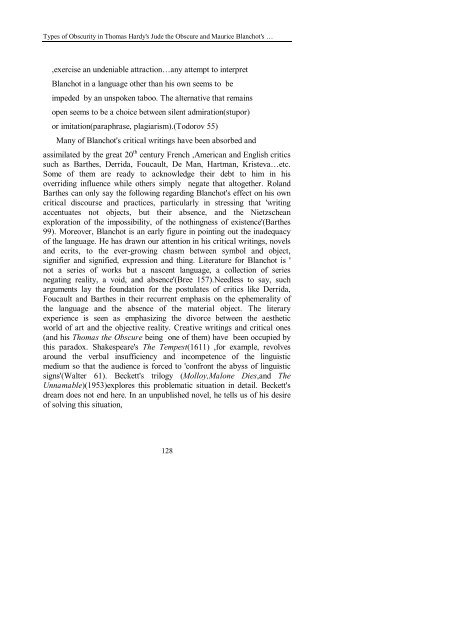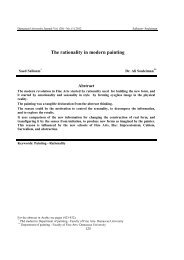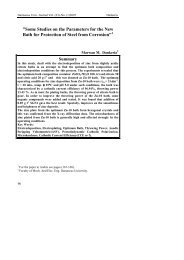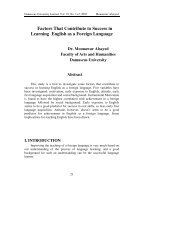Types of Obscurity in Thomas Hardy's Jude the Obscure and ...
Types of Obscurity in Thomas Hardy's Jude the Obscure and ...
Types of Obscurity in Thomas Hardy's Jude the Obscure and ...
You also want an ePaper? Increase the reach of your titles
YUMPU automatically turns print PDFs into web optimized ePapers that Google loves.
<strong>Types</strong> <strong>of</strong> <strong>Obscurity</strong> <strong>in</strong> <strong>Thomas</strong> <strong>Hardy's</strong> <strong>Jude</strong> <strong>the</strong> <strong>Obscure</strong> <strong>and</strong> Maurice Blanchot's …,exercise an undeniable attraction…any attempt to <strong>in</strong>terpretBlanchot <strong>in</strong> a language o<strong>the</strong>r than his own seems to beimpeded by an unspoken taboo. The alternative that rema<strong>in</strong>sopen seems to be a choice between silent admiration(stupor)or imitation(paraphrase, plagiarism).(Todorov 55)Many <strong>of</strong> Blanchot's critical writ<strong>in</strong>gs have been absorbed <strong>and</strong>assimilated by <strong>the</strong> great 20 th century French ,American <strong>and</strong> English criticssuch as Bar<strong>the</strong>s, Derrida, Foucault, De Man, Hartman, Kristeva…etc.Some <strong>of</strong> <strong>the</strong>m are ready to acknowledge <strong>the</strong>ir debt to him <strong>in</strong> hisoverrid<strong>in</strong>g <strong>in</strong>fluence while o<strong>the</strong>rs simply negate that altoge<strong>the</strong>r. Rol<strong>and</strong>Bar<strong>the</strong>s can only say <strong>the</strong> follow<strong>in</strong>g regard<strong>in</strong>g Blanchot's effect on his owncritical discourse <strong>and</strong> practices, particularly <strong>in</strong> stress<strong>in</strong>g that 'writ<strong>in</strong>gaccentuates not objects, but <strong>the</strong>ir absence, <strong>and</strong> <strong>the</strong> Nietzscheanexploration <strong>of</strong> <strong>the</strong> impossibility, <strong>of</strong> <strong>the</strong> noth<strong>in</strong>gness <strong>of</strong> existence'(Bar<strong>the</strong>s99). Moreover, Blanchot is an early figure <strong>in</strong> po<strong>in</strong>t<strong>in</strong>g out <strong>the</strong> <strong>in</strong>adequacy<strong>of</strong> <strong>the</strong> language. He has drawn our attention <strong>in</strong> his critical writ<strong>in</strong>gs, novels<strong>and</strong> ecrits, to <strong>the</strong> ever-grow<strong>in</strong>g chasm between symbol <strong>and</strong> object,signifier <strong>and</strong> signified, expression <strong>and</strong> th<strong>in</strong>g. Literature for Blanchot is 'not a series <strong>of</strong> works but a nascent language, a collection <strong>of</strong> seriesnegat<strong>in</strong>g reality, a void, <strong>and</strong> absence'(Bree 157).Needless to say, sucharguments lay <strong>the</strong> foundation for <strong>the</strong> postulates <strong>of</strong> critics like Derrida,Foucault <strong>and</strong> Bar<strong>the</strong>s <strong>in</strong> <strong>the</strong>ir recurrent emphasis on <strong>the</strong> ephemerality <strong>of</strong><strong>the</strong> language <strong>and</strong> <strong>the</strong> absence <strong>of</strong> <strong>the</strong> material object. The literaryexperience is seen as emphasiz<strong>in</strong>g <strong>the</strong> divorce between <strong>the</strong> aes<strong>the</strong>ticworld <strong>of</strong> art <strong>and</strong> <strong>the</strong> objective reality. Creative writ<strong>in</strong>gs <strong>and</strong> critical ones(<strong>and</strong> his <strong>Thomas</strong> <strong>the</strong> <strong>Obscure</strong> be<strong>in</strong>g one <strong>of</strong> <strong>the</strong>m) have been occupied bythis paradox. Shakespeare's The Tempest(1611) ,for example, revolvesaround <strong>the</strong> verbal <strong>in</strong>sufficiency <strong>and</strong> <strong>in</strong>competence <strong>of</strong> <strong>the</strong> l<strong>in</strong>guisticmedium so that <strong>the</strong> audience is forced to 'confront <strong>the</strong> abyss <strong>of</strong> l<strong>in</strong>guisticsigns'(Walter 61). Beckett's trilogy (Molloy,Malone Dies,<strong>and</strong> TheUnnamable)(1953)explores this problematic situation <strong>in</strong> detail. Beckett'sdream does not end here. In an unpublished novel, he tells us <strong>of</strong> his desire<strong>of</strong> solv<strong>in</strong>g this situation,128
















